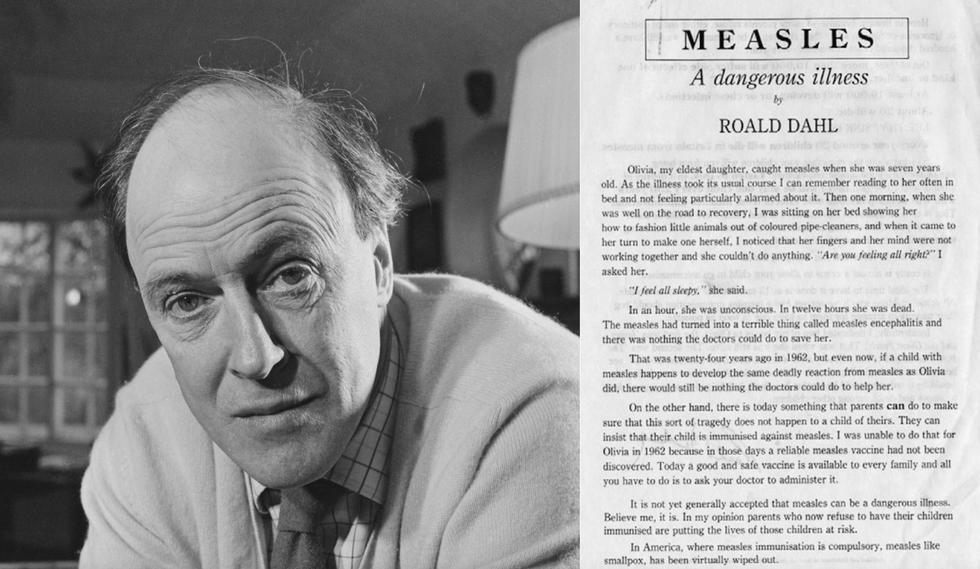Roald Dahl lost a child to measles. Here's what he has to say about the new outbreaks.

Olivia Dahl, shortly before her death from measles in 1962.
In 1962, the world was a remarkably different place: Neil Armstrong had yet to take his first steps on the lunar surface, John F. Kennedy was serving as president of the United States, and the Beatles were still a few years away from superstardom, having just recorded their first single.
The word “measles” was also a household name. Measles, which still exists in parts of the world today, is a highly contagious viral infection that typically causes fever, cough, muscle pain, fatigue, and a distinctive red rash. Measles was so pervasive around the world in 1962 that most children had gotten sick with it before the age of fifteen—but even though it was common, it was far from harmless. Measles killed around 400 to 500 people per year in the United States, and approximately 2.6 million people each year worldwide. Countless others suffered severe complications from measles, such as permanent blindness.
Tragedy hits home

Author Roald Dahl at his Buckinghamshire home with Olivia, daughter Chantal, and wife Patricia Neal in 1960.
Ben Martin / Getty Images
That year, British author Roald Dahl was beginning to make a name for himself, having just published his best-selling book James and the Giant Peach. Dahl, who would go on to write some of the most well-loved children’s books of the century, lived in southern England with his wife and three children. One day, Dahl and his wife, actress Patricia Neal, received word that there was an outbreak of measles at his daughters’ school.
While some parents quarantined their children, many others also considered measles a harmless childhood disease. Neal later recalled in her autobiography that a family member had advised her to “let the girls get measles,” thinking it would strengthen their immune systems and be “good for them.” Reluctantly, Dahl and Neal let their two school-aged children, Olivia and Chantal, continue school. Olivia, then aged seven, fell sick with the measles not long after that.
Neither Dahl nor Neal were terribly concerned about Olivia’s infection. Dahl would write later that it seemed to be taking its “usual course,” and the two would read and spend time together while Olivia rested. After a few days of fever and fatigue, Dahl wrote, Olivia seemed like she was “well on the road to recovery.”
But one afternoon, as the two sat on Olivia’s bed making animals out of pipe cleaners, Dahl noticed that Olivia’s “fingers and her mind were not working together.” When Dahl asked how she was feeling, Olivia replied, “I feel all sleepy.”
Within an hour, Dahl wrote, Olivia was unconscious. Within 12 hours, she was dead.
Olivia died of measles encephalitis, an inflammation of the brain caused by an infection. Approximately 1 in 1,000 people infected with measles develop encephalitis, and of those who develop it, between 10 and 20 percent will die.
Dahl was overcome with grief and wracked with guilt for being unable to prevent his daughter’s death. Mourning, Dahl threw himself into his writing and, in his spare time, spent hours lovingly constructing a rock garden on Olivia’s grave in a local churchyard.
After Olivia’s death, Dahl wrote sixteen novels and several collections of short stories, including Matilda, Fantastic Mr. Fox, and Willy Wonka and the Chocolate Factory, which garnered him worldwide acclaim. His most influential piece of writing, however, wasn’t written until 1986.
A father's plea

Roald Dahl and the open letter he wrote in 1986, encouraging parents to vaccinate their children against measles.
By 1986, measles was no longer the global health threat that it had been in the 1960s, thanks to a measles vaccine that became available just one year after Olivia had died. Still, in the United Kingdom alone, approximately 80,000 people every year were infected with measles. This bothered Dahl, especially since measles rates in the United States had dropped by 98 percent compared to pre-vaccine years. “Why do we have so much measles in Britain when the Americans have virtually gotten rid of it?,” Dahl was reported to have said.
So Dahl set out to prevent a tragedy like Olivia’s from happening again. With encouragement from several prominent public health activists, Dahl wrote an open letter addressed to parents in the UK. The letter recounted his daughter’s death from encephalitis and begged parents to protect their own children from measles:
“...there is today something that parents can do to make sure that this sort of tragedy does not happen to a child of theirs. They can insist that their child is immunised [sic] against measles. I was unable to do that for Olivia in 1962 because in those days a reliable measles vaccine had not been discovered. Today a good and safe vaccine is available to every family and all you have to do is to ask your doctor to administer it.”
Dahl went on to say that although many parents still viewed measles as a harmless illness, he knew from experience that it was not. Measles was capable of causing disability and death, Dahl wrote, whereas a child had a better chance of “choking on a chocolate bar” than developing any serious complication from the vaccine. Dahl ended his letter by saying how happy he knew Olivia would be “if only she could know that her death had helped to save a good deal of illness and death among other children.”
Dahl’s letter was published in early 1986 and distributed to local healthcare workers, schools, and to parents of children who were particularly at risk. As the letter circulated, vaccination rates continued to climb year after year.
Thirty-one years after Dahl’s letter was published, and 55 years after Olivia’s death, the World Health Organization declared in 2017 that measles had officially been eradicated for the first time in the UK thanks to high rates of vaccination.
A small step back

As vaccination rates decline, measles is now making a strong comeback in the United States and elsewhere.
Getty Images
Today, vaccination rates for the measles are in decline, and countries like the UK and the US, who had once eradicated measles completely, are now seeing a comeback. The Centers for Disease Control and Prevention (CDC) recently reported that between December 1, 2023 and January 23, 2024, 23 cases of measles had been confirmed across multiple states. The majority of these cases, they reported, were among children and adolescents who had traveled internationally and had not yet been vaccinated even though they were eligible to do so.
Roald Dahl passed away in 1990, but fortunately, his writing continues to live on. While readers can explore fantastical worlds through his novels and short stories, they can also look back to a reality when tragic deaths like Olivia’s happened far too often. The difference is that today, thanks to modern science, we now have the tools to stop them.
Urinary tract infections account for more than 8 million trips to the doctor each year.
Few things are more painful than a urinary tract infection (UTI). Common in men and women, these infections account for more than 8 million trips to the doctor each year and can cause an array of uncomfortable symptoms, from a burning feeling during urination to fever, vomiting, and chills. For an unlucky few, UTIs can be chronic—meaning that, despite treatment, they just keep coming back.
But new research, presented at the European Association of Urology (EAU) Congress in Paris this week, brings some hope to people who suffer from UTIs.
Clinicians from the Royal Berkshire Hospital presented the results of a long-term, nine-year clinical trial where 89 men and women who suffered from recurrent UTIs were given an oral vaccine called MV140, designed to prevent the infections. Every day for three months, the participants were given two sprays of the vaccine (flavored to taste like pineapple) and then followed over the course of nine years. Clinicians analyzed medical records and asked the study participants about symptoms to check whether any experienced UTIs or had any adverse reactions from taking the vaccine.
The results showed that across nine years, 48 of the participants (about 54%) remained completely infection-free. On average, the study participants remained infection free for 54.7 months—four and a half years.
“While we need to be pragmatic, this vaccine is a potential breakthrough in preventing UTIs and could offer a safe and effective alternative to conventional treatments,” said Gernot Bonita, Professor of Urology at the Alta Bro Medical Centre for Urology in Switzerland, who is also the EAU Chairman of Guidelines on Urological Infections.
The news comes as a relief not only for people who suffer chronic UTIs, but also to doctors who have seen an uptick in antibiotic-resistant UTIs in the past several years. Because UTIs usually require antibiotics, patients run the risk of developing a resistance to the antibiotics, making infections more difficult to treat. A preventative vaccine could mean less infections, less antibiotics, and less drug resistance overall.
“Many of our participants told us that having the vaccine restored their quality of life,” said Dr. Bob Yang, Consultant Urologist at the Royal Berkshire NHS Foundation Trust, who helped lead the research. “While we’re yet to look at the effect of this vaccine in different patient groups, this follow-up data suggests it could be a game-changer for UTI prevention if it’s offered widely, reducing the need for antibiotic treatments.”
MILESTONE: Doctors have transplanted a pig organ into a human for the first time in history
A surgeon at Massachusetts General Hospital prepares a pig organ for transplant.
Surgeons at Massachusetts General Hospital made history last week when they successfully transplanted a pig kidney into a human patient for the first time ever.
The recipient was a 62-year-old man named Richard Slayman who had been living with end-stage kidney disease caused by diabetes. While Slayman had received a kidney transplant in 2018 from a human donor, his diabetes ultimately caused the kidney to fail less than five years after the transplant. Slayman had undergone dialysis ever since—a procedure that uses an artificial kidney to remove waste products from a person’s blood when the kidneys are unable to—but the dialysis frequently caused blood clots and other complications that landed him in the hospital multiple times.
As a last resort, Slayman’s kidney specialist suggested a transplant using a pig kidney provided by eGenesis, a pharmaceutical company based in Cambridge, Mass. The highly experimental surgery was made possible with the Food and Drug Administration’s “compassionate use” initiative, which allows patients with life-threatening medical conditions access to experimental treatments.
The new frontier of organ donation
Like Slayman, more than 100,000 people are currently on the national organ transplant waiting list, and roughly 17 people die every day waiting for an available organ. To make up for the shortage of human organs, scientists have been experimenting for the past several decades with using organs from animals such as pigs—a new field of medicine known as xenotransplantation. But putting an animal organ into a human body is much more complicated than it might appear, experts say.
“The human immune system reacts incredibly violently to a pig organ, much more so than a human organ,” said Dr. Joren Madsen, director of the Mass General Transplant Center. Even with immunosuppressant drugs that suppress the body’s ability to reject the transplant organ, Madsen said, a human body would reject an animal organ “within minutes.”
So scientists have had to use gene-editing technology to change the animal organs so that they would work inside a human body. The pig kidney in Slayman’s surgery, for instance, had been genetically altered using CRISPR-Cas9 technology to remove harmful pig genes and add human ones. The kidney was also edited to remove pig viruses that could potentially infect a human after transplant.
With CRISPR technology, scientists have been able to prove that interspecies organ transplants are not only possible, but may be able to successfully work long term, too. In the past several years, scientists were able to transplant a pig kidney into a monkey and have the monkey survive for more than two years. More recently, doctors have transplanted pig hearts into human beings—though each recipient of a pig heart only managed to live a couple of months after the transplant. In one of the patients, researchers noted evidence of a pig virus in the man’s heart that had not been identified before the surgery and could be a possible explanation for his heart failure.
So far, so good
Slayman and his medical team ultimately decided to pursue the surgery—and the risk paid off. When the pig organ started producing urine at the end of the four-hour surgery, the entire operating room erupted in applause.
Slayman is currently receiving an infusion of immunosuppressant drugs to prevent the kidney from being rejected, while his doctors monitor the kidney’s function with frequent ultrasounds. Slayman is reported to be “recovering well” at Massachusetts General Hospital and is expected to be discharged within the next several days.
